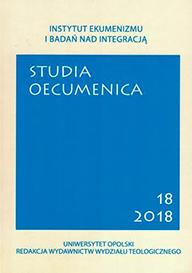Die Lehre Martin Luthers, die Ökumene der Gegenwart und die Chance des Reformationsjubiläums
Martin Luther’s teaching, the ecumenism of the present and the chance of the Reformation anniversary
Author(s): Joachim NowakSubject(s): Christian Theology and Religion, Evaluation research, 16th Century, Sociology of Religion, History of Religion
Published by: Uniwersytet Opolski
Keywords: Martin Luther; Reformation; main scriptures; Last Supper; ecumenism;
Summary/Abstract: In 1517 Luther, publishing his theses, rejected the papacy, the Catholic episcopate and the sacrament of Holy Orders, because the New Testament teaches the “universal priesthood” of the faithful. Luther did not want to acknowledge the visible church with its ministries and sacraments as a tool of salvation any more. Therefore, he denied the sacramental character of the church as a whole. He clung to the real presence of Christ with the figures of bread and wine. Luther wrote the first Latin Messordnung. The basic idea of his reformed theology was summarized in three principles: sola scriptura, sola gratia and sola fide. In the perspective of modern ecumenism the most important heritage of Martin Luther is his gospel of God’s grace and mercy.
Journal: Studia Oecumenica
- Issue Year: 2018
- Issue No: 18
- Page Range: 249-266
- Page Count: 18
- Language: German

